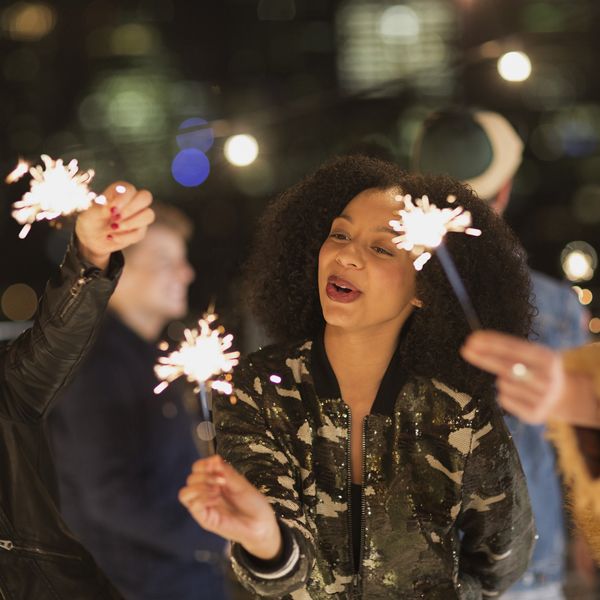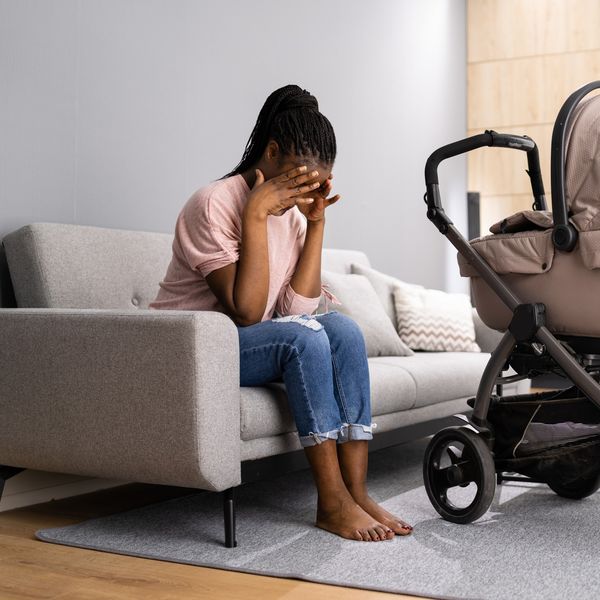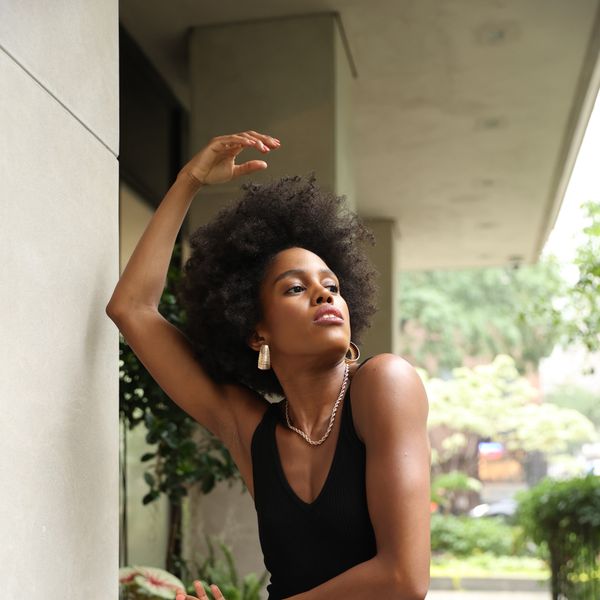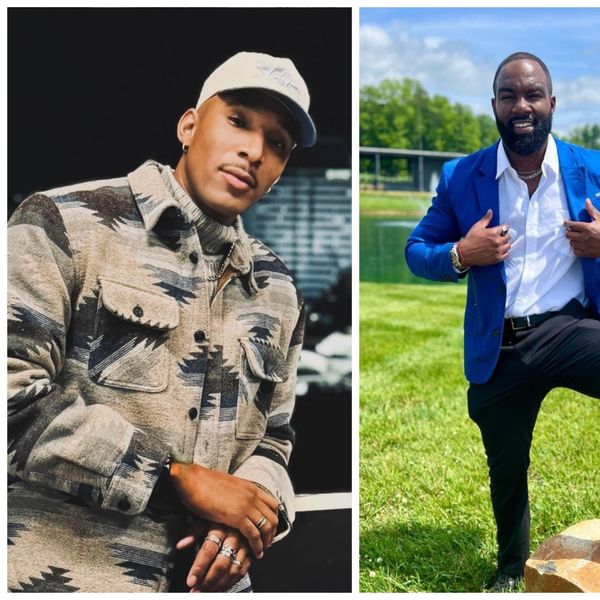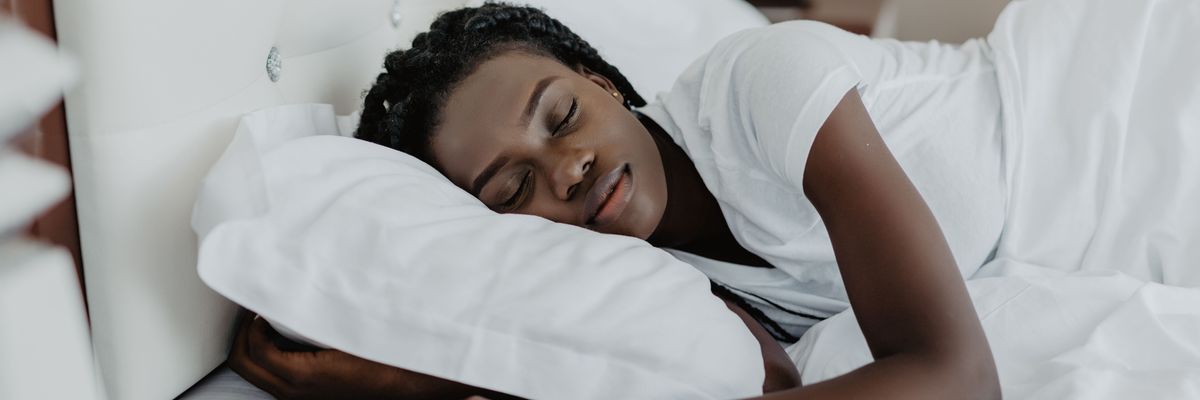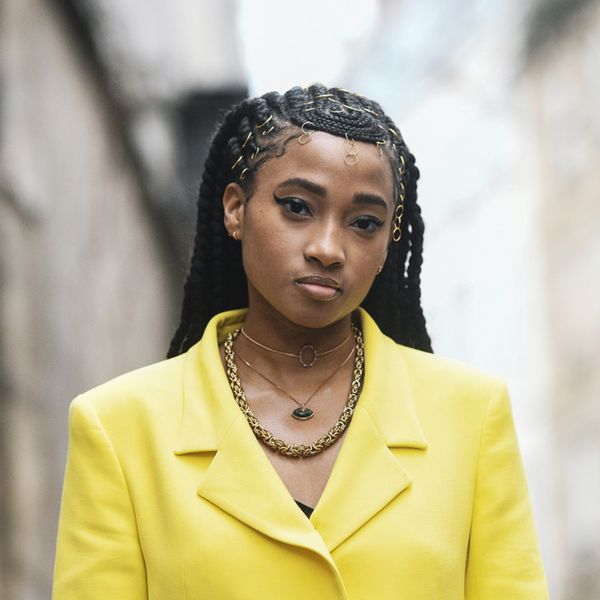
Living as a young black woman can sometimes seem like I am a walking threat. I am automatically "too much" for most when I walk into a room before I even speak a word. My existence alone is seen as intimidating. With all of that weight on my shoulders, it makes it extremely hard to show up and even harder to take up space.
To take up space is to acknowledge and accept your right to be, to exist, to have an opinion, to speak up, to simply be a body no matter what that looks like. But how can I live in all of that when I am inundated with society's definition of who I am? It's not easy but the defining factor is your choice to just be. My mom always told me, "Never dim your light for others because it's shining in their eyes." She didn't know it but she was telling me to take up space.
To take up space to some degree also means that you make room for others; by letting your light shine you empower others to do the same. The creatives on this list have made themselves responsible for telling our stories while also building more tables and more seats for others.
Ebonee Davis, Model & Activist
This top model has chosen to use her platform to be an unapologetic black girl which is no small feat in fashion. Ebonee Davis is a strong believer that fashion artists and creatives are the literal embodiment of free speech and they have a responsibility to use it wisely. In her powerful essay for Harper's Bazaar, she revealed some raw details about her upbringing. Being raised by drug addicts was one of the toughest things she had to overcome:
"Seeing my parents struggle pushed me to live beyond the status quo. Instead of living out my life as a product of my environment, I decided it was my job to break the chains of poverty, addiction and abuse; to rewrite my family history and live according to my own narrative. When I look back on my time in fashion, I realize that if it were not for my mistreatment as a Black model, I would not have the platform to inspire other young women of color to be their authentic selves, and to love themselves despite living in a society that constantly reaffirms our inadequacy."
When you see Ebonee on any red carpet or prime time event, she is representing the culture in ways little black girls must see. She had a wake up call in 2016 that catapulted her vision as a model. She started rocking her natural hair once she sat with herself and realized she had some subconscious beliefs tied to eurocentric beauty norms.
In a conversation with ESSENCE, she said:
"It just changed the way that I moved through spaces and now that I have access to spaces that aren't typically occupied by people who look like me, I feel like I have a duty to be outspoken. I am opening the door and I am leaving it open for people that are coming after me."
Kerby Jean-Raymond, Fashion Designer & Founder of Pyer Moss
Kerby Jean-Raymond founded the ultra-stylish and wildly woke brand, Pyer Moss, in 2013 as an art project. Little did he know that his art project would blossom into one of the biggest, most thought-provoking fashion houses in the game. With collections produced in New York, Italy and Portugal, Pyer Moss aims to use its voice and platform to challenge social narratives and evoke dialogue.
Noted for his "They Have Names" shirt featured on Colin Kaepernick, his "Stop Calling 911 on The Culture" design during the SS19 collection debuted at one of the country's first free black communities and every single moment during the SS20 collection at King's Theater this past September.
If you aren't hip to his magical designs and productions, then I am sure you may have recently seen his read on a major fashion publication. Business of Fashion has been naming 500 of the most innovative creatives for the past seven years and, this year, while the Haitian-American designer was a part of the list, he wasn't here for BoF's tomfoolery after a long list of hell nahs. Kerby took to Medium to pen a thoughtful yet truthful letter to the world.
My favorite excerpt:
"In short, fuck that list and fuck that publication. I take no ownership of choirs, Christianity or curating safe spaces for black people. That's a 'We' thing. Homage without empathy and representation is appropriation. Instead, explore your own culture, religion and origins. By replicating ours and excluding us — you prove to us that you see us as a trend. Like, we gonna die black, are you?"
Our boy could teach a whole class on taking up space because not only does he create spaces to tell our stories but he corrects those who frame it as such but only want to keep the culture as a fad.
Lindsey Peoples-Wagner, Editor-In-Chief of Teen Vogue
It's no secret I am obsessed with this human. Not many editors-in-chief have made it their business to show up for many underrepresented communities. At 29 years young, she is the youngest EIC at a major publication and that fact isn't lost on her as she continues to bring new and fresh perspectives to fashion.
Last year, we had the amazing opportunity to chop it up with her and she shared that she never thought that she would evolve from an assistant to an EIC. "I never thought it would happen but I'm so grateful that I am! I am really passionate about what I do, and I'm looking forward to using this platform to further conversations on inclusivity, diversity, and the future of fashion." Lindsay has always been a proponent of having larger conversations in fashion and not just focusing on trend reports.
In our exclusive interview she also shared, "I was always interested in fashion and beauty, but I think as a Black woman it just took time for me to really develop the lens in which I talk about those things. I've had a lot of conversations with mentors over the past couple years about who I want to be when I 'grow up', and I realized there were bits and pieces of a lot of different people and career paths that I wanted to mold into one, even if it didn't exist already."
Lindsay has always been open about what it means to have a seat at the table because it's more than pretty clothes. She believes that if you're at the fashion table, it's your obligation to move past the "gratitude" and move into the capacity to speak up and be the voice for those who have not yet made it to the table.
Melina Matsoukas, Visionary
Some call her the provocateur behind Beyoncé, Rihanna, and Issa Rae since she is responsible for some of our favorite visuals like "Formation", "We Found Love" and episodes of her hit show Insecure. Traditionally, Melina holds titles as a director of music videos and television shows. She began her journey snapping photos of her friends decked out in African garb. That led her to study film at New York University and cinematography in the graduate program at the American Film Institute. Her full circle moment happened this year when she was awarded the Franklin J. Schaffner Alumni Medal from AFI.
Most recently, with the talented Lena Waithe, she produced Queen & Slim, a film chronicling the journey of a black couple who go on the run after killing a police officer in self-defense. She told Variety.
"It's a story that I'm excited to tell because it challenges the idea of black love as well as the status quo. Lena and I hope that it sparks a dialogue and challenges people's views. I couldn't have made it through this process without Lena. On 'Master of None,' she trusted me with her personal story. Now I get to do this film with her — my soul sister."
As a creator, Melina finds power in documenting our stories in the most authentic ways. Most of all, her work is true to life. She never squanders an opportunity to bring light to injustices. For example, during the ELLE 2019 Women in Hollywood event, she dedicated her speech to Atatiana Jefferson by saying:
"I was up late last night trying to write my speech, trying to show my appreciation for the opportunities and the love and support I've been given."
"Trying to use my breath and my voice to create change and inspire on this stage today, but all I could think of were those whose breath was taken from us. All I could think of were my sisters who are not here, who could no longer speak, love, or thrive solely because of their existence as black woman. [Jefferson] was killed in her own bedroom, which is meant to be a safe haven for a person. She was murdered by someone meant to protect and to serve her. She was murdered because she was black."
Candace Marie, Social at Prada
She's the unapologetic black AF force behind Prada's social media and a constant street style killa. During an exclusive interview with us, she told us about her thoughts on inclusivity in fashion, "They can do way better. So much is hidden and deep-rooted that they don't realize what it is. I could be sitting in a board meeting and I question why am I the only black person out of 45 people that are here?"
She went on to say that she doesn't want to be the Bible for all things black but also realizes that there needs to be a shift and a change. "I honestly noticed it more as I started to travel and go to Fashion Weeks. You're not seeing any other women of color at the shows especially going into the luxury space. I remember a photographer told me he was shooting me because he wanted to make the street style some type of diverse. It's not their fault. Women of color are not being invited to these shows therefore you can't capture what's not there so it's like this domino effect."
That's why the Arkansas native pops out at international fashion weeks. To show up and take up space in her best cultured getups and hairstyles. She's leaving her foot print all over the fashion industry and we love that she's not afraid to be the first that looks like her to bring up topics and conversations outside of fabrics and designs.
Want more stories like this? Sign up for our newsletter here and check out the related reads below:
10 Female Photographers Putting On For The Culture
OlanikeeOsi Is The Bold, Fearless & Totally Unapologetic CEO Of The SelfishBabe App
10 Habits Of Successful Creatives
7 Unapologetic Women Share Their Personal Journey To Self-Love
Featured image by Creative Lab / Shutterstock.com
- Creative Commons: When we share, everyone wins ›
- 11 Black Visionaries Who Are Changing the Luxury Space Right Now ›
- Meet Ayoni, the Singer Creating Space for Black Creatives to be Weird ›
- The Success Of CultureCon Proves Black Creatives Got Next ... ›
- The iNCubator is Co-working for Black Creatives - Queen City Nerve ›
- Atlanta's newest space for Black creatives | The Atlanta Voice ›
- Goldn Roots: Black Creative Marketplace + Coworking Space ... ›
- Harlem's Hip Hop Film Festival Provides A Safe Space For Black ... ›
This Is How To Keep 'Holiday Season Stress' From Infecting Your Relationship
Hmph. Maybe it’s just me, but it seems like there is something really weird happening in the fall season air (because winter doesn’t officially begin until December 21) that cuddle season is in full swing while break-up season is as well. In fact, did you know that break-ups are so popular during the holiday season that December 11 is deemed Break-Up Day?
The reasons why relationships shift around this time vary; however, I did both roll my eyes and chuckle when I read that a very popular one is because it’s an easy way to get out of getting one’s significant other a Christmas present. SMDH.
Anyway, I personally think that the less shallow folks out here may contemplate calling things “quits” or they at least distance themselves a bit from their partner (and what I’m referring to is serious relationships) due to all of the stress and strain that oftentimes comes with the holidays whether it be financial, familial, due to their tight schedules or something else.
Listen, I would hate for you and your man to miss the fun and happiness of experiencing this time of year, all because you are so overwhelmed or irritated that you can’t really enjoy it. That’s why I have a few practical tips for how to avoid allowing the typical holiday season stress from INFECTING your relationship.
Manage Your Expectations
 Giphy
GiphyUnmanaged expectations. If there is a main reason why the holiday season tends to be so stress-filled for so many people, I’d bet good money that this is the cause. And when you’re in a long-term relationship, expectations can manifest themselves in all sorts of cryptic and/or unexpected ways. You might have relatives who assume that you are going to be with them for Thanksgiving or Christmas when you have other plans in mind. You might be thinking that you are going to spend one amount for presents while your man is thinking something totally different. When it comes to scheduling, your signals may be crossed.
And you know what? To all of these scenarios, this is where clear and consistent communication come in. Don’t assume anything. Don’t dictate anything either. From now until New Year’s, mutually decide to check in once a week, just to make sure that you are both on the same page as it relates to the holidays and what you both are thinking will come along with it. The less blindsided you both feel, the less stressed out you will be. Trust me on this.
Set (and Keep) a Budget
 Giphy
GiphyOkay, so I read that last year, 36 percent of Americans incurred some type of holiday-related debt. Hmph. Last year, there was still some sense of normalcy in this country, chile, so I can only imagine what finances are gonna look like over the next several weeks. That said, since I don’t know a lot of people who don’t find being broke stressful, make sure that you and your bae set a budget and then stick to it this year — no ifs, ands or buts.
Because really, y’all — it doesn’t make sense to deplete savings and/or max out credit cards for a few days of giggles only to be damn near losing your mind because you don’t know how to make ends meet come Dr. Martin Luther King, Jr. Day.
And by the way, this tip doesn’t just speak to things like food and gifts; I also mean travel. If it doesn’t make a ton of sense (or cents) to be all over the place this year — DON’T BE.
Keep Matthew 5:37 at the Forefront
 Giphy
GiphyIf off the top of your head, you don’t know what Matthew 5:37 says, no worries, here ya go: “But let your ‘Yes’ be ‘Yes,’ and your ‘No,’ ‘No.’ For whatever is more than these is from the evil one.” That verse right there? Oh, it’s a boundaries lifesaver! I say that because do you see “maybe” or “I’ll think about it” in there? Nope. LOL. It says that you should tell people “yes” or “no” and leave it at that — and that complements Anne Lamott’s quote, “’No’ is a complete sentence” impeccably well. Yeah, you’ve got to remember that anything beyond a yes or no to a request is privileged information; you don’t owe anyone details or an explanation.
Besides, if you are really honest with yourself, when someone asks you something and you give a “Umm, let me think about it” kind of reply, more times than not, you already know what your answer is going to be — so why not let you both off of the hook? Give your response. Commit to that. And let everyone (including yourself) get on with their lives and schedules.
I promise you that when it comes to those holiday parties, you are pissing more folks off by not RSVP’ing or doing so and not showing up than just saying, “Thank you but not this year” off the rip.
Remember That Your Personal Space Is Privilege Not a Right
 Giphy
GiphyA friend of mine recently bought a new house and invited me over to come see it. He’s a single man with no children, so as I was taking in all of the space that he had, especially as I walked through his finished basement, I joked about relatives coming to live with him. “Hell no” and “absolutely not” were pretty much his immediate responses as he went on to say that some folks even had the nerve to be offended when he told them that he had no intentions on taking DNA in.
Ain’t it wild how people think that your stuff is their right? And yes, that brings me to my next point. Your home is your sanctuary space. If you want to host folks this year — cool. If not, ALSO COOL. Please don’t let folks (family included) guilt you into how they want you to act or even into what they would do if the shoe was on the other foot. You are not them — and as one of my favorite quotes states, “If two people were exactly alike, one of them would be unnecessary.” (A man by the name Larry Dixon said that.)
Hell, my friends? They know that I am good for sending them random things that they need or even want all throughout the year. Coming over to hang out at my pace, though. Uh-uh. Chalk it up to being a card-carrying member of the ambivert club yet I like keeping my living space personal — and I sleep like a baby, each and every night, for feeling that way.
Always remember that your space, your time, your resources, your energy and shoot, yourself period (including your relationship), are all things that are your own. You get to choose how, when and why you want to share them. The holiday season is certainly no exception.
Cultivate Some “You Two Only” Traditions
 Giphy
GiphyIt’s not uncommon for some couples to hit me up after the holiday season to “detox.” Sometimes it’s due to the financial drama (and sometimes trauma) that they experienced. Sometimes it’s because they allowed their relatives (especially in-laws) to get more into their personal business than they should’ve. More than anything, though, it tends to be because they didn’t get enough quality time together and so ended up feeling “disconnected.”
Please don’t let that happen. Listen, I’m not even a holidays kind of woman and yet, I will absolutely sit myself down with some hot chocolate and chocolate chip cookies to enjoy a Hallmark holiday film or two. Aside from the fact that most of them are lighthearted and sweet, I also like that they usually focus on couples loving on each other amidst all of the holiday beauty and ambiance — which is something that all couples should set aside some time to do.
Maybe it’s a vacation. Maybe it’s a staycation. Or maybe it’s my personal favorite, A SEXCATION. Whether it’s for a few days, the weekend or even overnight — don’t you let the holidays go by without setting aside time for you and your man to celebrate one another. Don’t you dare (check out “Are You Ready To Have Some Very Merry 'Christmas Sex'?”).
GET. SOME. REST.
 Giphy
GiphyI once read that 8 out of 10 people get stressed out over the holidays and 3 out of 10 lose sleep during to it — and when you’re stress-filled and sleep-deprived, that can absolutely lead to hypersensitivity, making mountains out of molehills and even not being in the mood for sex.
Your relationship can’t afford to go through any of this, so definitely make sure to prioritize rest. I don’t care how unrealistic it might seem during this time, sleep should never be seen as a luxury; it will always and forever be a great necessity.
That said, try to get no less than six hours of shut-eye in (check out “6 Fascinating Ways Sex And Sleep Definitely Go Hand In Hand”) and even ask your bae to take a nap with you sometimes (check out “Wanna Have Some Next-Level Sex? Take A Nap, Sis.”). Not only will sleep help to restore your mind, body and spirit but, when it’s with your partner, it’s an act of intimacy that can make you both feel super connected, even in the midst of what might feel like chaos.
___
Holiday season stress is real. Still, never give it the permission or power to throw your relationship off. Put you and your man first and let the holidays be what they are gonna be, chile.
Let’s make things inbox official! Sign up for the xoNecole newsletter for love, wellness, career, and exclusive content delivered straight to your inbox.
Featured image by Shutterstock
While doing a podcast interview a couple of weeks ago, when I said my age, the interviewer complimented me by saying that what I said is not what they would’ve guessed. When they asked what the secret was, the first thing that came out of my mouth was, “Oh, I’m gonna take me a nap.”
I adore sleep. I’ve said before that it’s like what Six Flags is to some people. And really, it’s just a plus that there are so many health benefits from getting plenty of rest. Beauty-wise, science does reveal that getting no less than seven hours a night can slow down signs of aging. Know what else? There are some direct things that sleep — and the lack thereof — can do to your immunity as well.
And so, since this is the time of year when catching a cold (and/or the flu) is common, let’s talk about the impact that sleep (and again, a lack thereof) has on your immune system. That way, you can remain as healthy as possible during the fall and winter seasons.
1. Less Sleep Means More Colds
 Giphy
GiphyLike I stated in the intro, I’m pretty sure you’ve heard somewhere that the fall and winter are the seasons when people are most susceptible to catching a cold or coming down with the flu. And that’s exactly why I thought I would start this all off by sharing the fact that some studies reveal that if you get less than six hours of sleep, on a consistent basis, you end up making yourself more vulnerable to coming down with both. In fact, some research says that only 18 percent of people who get six-plus hours of rest caught a cold while almost 40 percent who got less than that did.
The logic behind it all is sleep gives your body time to build up the proteins and cells (like cytokines and T-cells) that you need to fight off certain viruses. So, if nothing bothers you more than having a stuffy nose or stubborn cough when it’s cold outside, getting more sleep is one way to prevent that from happening to you.
2. Less Sleep Means More Allergy Symptoms
 Giphy
GiphyAt the end of the day, an allergy is basically what transpires whenever your immune system “overreacts” to something that other people’s systems do not. And since sleep is what helps to keep your immune system nice and strong — well, I’m sure you get how less allergy-related symptoms and more sleep go hand in hand. Also, since sleep helps to decrease bodily inflammation (more on that in a bit) and inflammation can also intensify allergy symptoms, that’s just one more reason to get as much shut-eye as possible.
3. Less Sleep Means Potential Diabetes and Heart Disease
 Giphy
GiphyDid you know that in 2024, Black women were diagnosed with diabetes 24 percent more than any other adult demographic. Also, it continues to be a reality that heart disease is the leading cause of death for Black women. These two sobering statistics alone should be enough of an incentive to do whatever you can to keep the risk of diabetes and heart disease way down.
One way to do that is by getting more sleep. Aside from the fact that sleep strengthens your immune system to where it is easier for you to fight off illness and diseases, sleep can keep your blood sugar levels in a healthy space; plus, when it comes to your heart, it gives it, along with your arteries and blood vessels a break.
4. Less Sleep Means Less Time for Your Body to Push “Reset”
 Giphy
GiphyIf you really stopped to consider all that your body goes through during the day (you can read some about that here), you definitely would respect it enough to do your best to thank it by giving it no less than six hours of sleep, each and every night. Sleep is what helps to slow your brain and body down so they are able to “refuel” for the next day. After all, how can your body prevent you from getting sick if your immune system is too worn out to fight ailments off? Exactly.
5. More Sleep Helps You to Fight Off Infections
 Giphy
GiphySpeaking of, in order for your body to fight off infections, there are certain cells and antibodies within you that need to be healthy and strong — one way that they get and stay that way is by you getting a good amount of sleep. For instance, remember when I touched on cytokines earlier? Well, the same way that they help to prevent colds, they also help to prevent infections too. And since sleep lowers your cortisol (stress) levels, rest gives your body the time and space to build up an army that can fight off free radicals and other health-related challenges while you are awake.
6. More Sleep Lowers Bodily Inflammation
 Giphy
GiphyWhenever a health-related issue is mentioned on this platform, inflammation is something that is mentioned quite a bit. Probably the easiest way to explain inflammation is it’s how your body responds/reacts whenever something is happening to your body that shouldn’t be, whether it’s an illness, an injury, a germ or something that you may be allergic to.
If you happen to have chronic inflammation, some symptoms that are associated with that include fatigue, stiff joints, skin rashes, weight gain and moodiness.
The interesting thing about all of this is if you aren’t getting enough rest, you could be triggering inflammation in your body. That’s because studies reveal that a lack of sleep can elevate molecules that are associated with inflammation. So, if you don’t want inflammation to increase within your system, you should definitely catch more zzz’s.
7. More Sleep Regulates Hormones
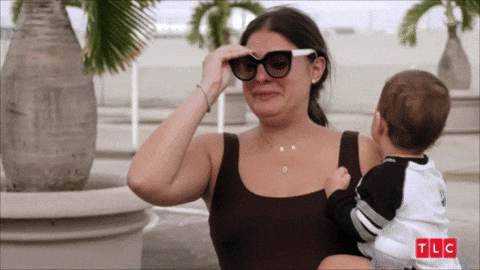 Giphy
GiphyWhen it comes to hormones like serotonin, estrogen and cortisol, believe it or not, they play a role in how your immune system acts and overreacts. That’s because, if your hormones are out of balance, that can cause your immune system to work harder than it actually should and that can make you more vulnerable to sickness. One way to keep your hormones leveled out? SLEEP.
That’s because sleep gives your body the opportunity to rest, repair and restore your hormone levels. On the other hand, when you are sleep deprived, that can put/keep your hormones on the ultimate roller coaster ride. #notgood
8. More Sleep Strengthens Vaccines
 flu shot GIF - Find & Share on GIPHYGiphy
flu shot GIF - Find & Share on GIPHYGiphyIf you’re someone who is good for getting some sort of vaccine around this time of the year, make sure that you rest up before and after getting your shots. Not only does adequate rest before a vaccination help your immune system to be better receptive to your shots but sleep also helps your body to build up enough antibodies to make your vaccinations effective after getting them. Because if you’re gonna get pricked, shouldn’t it be worth it? My thoughts exactly.
Get some freakin’ sleep! Your immune system depends on it.
Let’s make things inbox official! Sign up for the xoNecole newsletter for love, wellness, career, and exclusive content delivered straight to your inbox.
Featured image by Shutterstock



